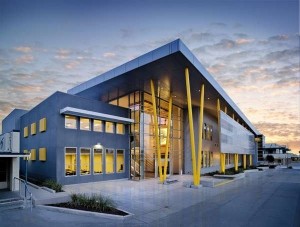What Makes a Great Modern High School?
Reputation isn’t everything. With Ofsted’s ‘outstanding’ grades criticised by Dame Alison Peacock it can now be difficult for teachers and parents to find a truly great modern high school. Some have even called for a total scrap of Ofsted, but in the meantime, no solution has been agreed.
Whether you’re looking for a new teaching role in a school or are searching for the ideal place to send your children, it can be daunting. What are the criteria you should look for in modern high schools?
IT support
Perhaps the most important feature of a modern school is its IT infrastructure. More and more of our society is impacted and influenced by computers and the internet, and schools should provide an immersive technological environment for students and staff.

When looking at schools, ask questions about their current and future plans for IT. Collaborative classroom tools and a robust social media policy are good indicators for schools that take technology seriously.
Excellent parent teacher networking opportunities
Research shows that good links between parents and school teachers improves student enjoyment, and their chances of doing well. The more a parent understands what their child is learning, the more they can offer support and guidance. The key is open communication.
A few good schools offer social events outside of the regular parents’ evenings, giving a more frequent and informal opportunity for teachers and parents to network freely.
Adoption of contemporary teaching methods
Monkseaton High School in Tyne and Wear, 2016 contender for the Secondary School of the Year at the annual TES Schools Awards, has gained national praise for its innovative teaching methods.
Monkseaton High School took the inspired step of developing Spaced Learning. Spaced Learning is a method of embedding information in our long-term memory through repetition.
Spaced Learning is significant because it deploys neuroscientific research, which enables this process to take place very quickly.
Through thinking outside the box, working with the students, for the students, the school has made new educational breakthroughs.
Ethical and environmentally friendly
With the carbon footprint of schools reaching 9.4m tonnes CO2, there have been many efforts for ‘greener’ schools. Reducing carbon is not the only purpose of these endeavours. School buildings, food, waste and even the school curriculum should all support a connection to the environment.
One school has successfully incorporated green ways into house rules, with their mission statement being, “To promote environmentally friendly behaviour in school and beyond.”
That school is Sheffield High School for Girls. The school has been awarded the environmental ‘Green Flag’ for the third time from the Eco-Schools Scheme in Autumn 2016.
Aside from being a show of a school’s prudential ethos, it encourages students and staff to work together for a greater good beyond the classroom walls. It teaches students about the world at large and how they impact on it.
Friendly atmosphere
A warm, and welcoming atmosphere benefits all who enter a school.
Truro High School in Cornwall have said “Visitors are always struck by the friendliness and all-round enthusiasm of our Senior pupils. Encouraged to follow their dreams, they like to aim high”.

In a recent survey at the school, “happy” was used more than any other word to describe life at Truro and this results in very impressive results.
Last year, Truro High School scored a 99.6 per cent pass rate and celebrated the best GCSE results in years, going to show that happy students results in excellent grades.
Great modern foreign languages
The future of modern foreign languages in secondary schools is looking pretty bleak.
According to new data from the Teaching Schools Council less than half of secondary school pupils take a MFL GCSE with just one third achieving a good grade. There is also a chronic shortage of MFL teachers.

A school with a good MFL programme is a rare thing, resulting in only the most dedicated and forward thinking of schools now offering them. One such school is Chelmsford’s King Edward VI Grammar School in Essex.
“KEGS” as it’s known saw Year 9 linguists excel with their GCSEs in French and German, with an astonishing 70% of grades at A* and an A*/A percentage of 94% - both new school records. This demonstrates that if the school offers such programmes and the teachers are behind it, a UK school can excel in MFL.
Visionary leadership
Like so many areas in life, a great leader helps shape, define and drive a group or organisation. Schools with excellent head teachers stand out a mile.
Often there will be something unique about the head’s beliefs and/or teaching methods and it’s these maverick approaches to education that get them noticed and make all the difference.
A school with an illustrious head encourages students and teachers to thrive, benefiting individuals and the school at large.
Successful leaders have "great vision – the ability to formulate and shape the future, rather than be shaped by events", says Richard Harman, headmaster of Uppingham School, Rutland.
Holland Park School Head Colin Hall is a wonderful example of a visionary leader. Clear-sighted, committed and inspirational, Hall wants his school to have 'the values and standards of a Fifties grammar school, available to everybody'.
Through Mr Colin Hall’s vision Holland Park School is profoundly dedicated to exacting high standards. Holland Park School strives to see people’s potential and makes detailed plans for its realisation is at the centre of its approach. “Recognising people’s personal strengths and development profile is important”.
Finding a truly great modern high school with which to work can take some time and research. Put in the groundwork and don’t be afraid to approach other teachers and those in education for recommended schools.
Top schools as cited by Ofsted can be a good rule of thumb but don’t let it be your only measurement of a school’s success.

Classrooms today look significantly different to classrooms just three years ago.
Gone are the days of the lone computer in the corner. Today’s classrooms boast laptops, tablets, smartphones and some even have Interactive Flat Panel Displays (IFPDs).
The drivers for this are tech savvy pupils. We now live in an age where even toddlers are familiar with how to use tablets, and before long virtual and augmented reality will become their norm.
With the rise of ever more technically fluent children and teenagers comes many concerns about the appropriateness of the internet and other technologies in academia. Parents and teachers alike have voiced concerns about the role technology should play in a child’s learning.
This is what I’m really interested in. To what extent do you think technology should shape learning? How willing are you to adapt and adopt?
The EdTech boom
In their 2020 EdTech vision, The Education Foundation says, “There are so many reasons to be optimistic and to celebrate EdTech – education and learning technology – across our nation. Educators and young people are pragmatic and often behave with realism about technology that can sometimes seem to be missing in some debates”.
In recent years there has been several developments in technology aimed to help children collaborate, instead of working alone.
An Interactive Flat Panel is one technology that aims to get children working together in the classroom. The benefit of this was explored by the University of Illinois study that found children who took part in group learning develop better decision making skills.
Teaching with technology
Technology should be an addition to traditional teaching, enhancing it for both students and teachers - never substituting it. Much like in our world, emails will never replace the impact you get from a face-to-face meeting with you candidates.
One way it is shaping new learning is by easing the burden of lesson planning.
Lesson planning and preparation, as many teachers will know, takes up a large part of your time.
Technology such as Promethean’s ClassFlow lets teachers plan highly interactive, multi-media-laden lessons and can help make assessments and assignments just by answering questions about the subject you intend to teach. These can then be shared both in and out of classroom.
Not only can ClassFlow support lesson planning but it can also give teachers the chance to use real-time feedback, allowing them to gauge how well a class comprehends a lesson, even pinpointing student’s individual understanding. This allows a teacher to give extra support to students who are having difficulty grasping the subject, or even readdress points to the whole class if failure to understand certain areas is across several students. This then gives the school an improvement in overall grades.
One of the highlights of using technology in teaching is that it allows for education to continue outside of the standard classroom hours, releasing the boundaries by time in class.
With technology students can go over lessons in their own time from home to boost their understanding of the topics covered. Laptops, smartphones and tablets will all become key to learning remotely.

Heightened collaboration
Technology is also encouraging students to work more collaboratively. IFPDs
let students contribute content, engage with each other, and even help shape future lessons. Technology allows students to create new ways to approach problem solving along with working together with fellow students, which will become an essential skill in their careers going forward.
Whilst textbooks are still a key part of learning in classrooms across the country, it’s important to acknowledge that students rely on the internet more and more for researching and supporting their learning.
With exciting interactive apps and touchscreen display units, learning is presented in a far more interesting and engaging way than ever before. Students can download homework straight from a portal and contact a teacher outside of hours for extra support if need be.
Teachers should understand, accept and encourage technology in learning as it’s to the benefit of students, teachers and society at large.
I’d love to get your thoughts on this hot topic.
How Teaching Could Change this Year

Our team places itself at the heart of today’s education sector. To provide for the professionals and institutions of the country, we must have absolute knowledge of the shifts that will affect their worlds. That’s why we have gathered insight from our team to offer our thoughts on the key topics that will characterise 2017 in education.
What’s up with the Higher Education Bill?
Much disputed, the government is doing its best to pass the Higher Education and Research Bill - which will introduce a wide range of changes to how university students are taught. The meaning of it is to promote a more experiential, innovative learning environment - it will also allow private colleges to profit from awarding degrees.
With Britain’s best universities regularly listed in the world’s top 20, it is hard to believe that great teaching is a problem in our universities – but it is something that the Bill aims to improve. Regardless, this will be contested in the House of Lords in the coming months, and it would be worth keeping an eye on the conversation.
Will the Bill redefine the role of a university in Britain, commercialising the sector? Some are saying, yes.
Innovation in schools
It is no secret that the sector is being modernised. Most of the debate today is over whether change is happening fast enough. This year, we suspect that the changes will be thicker and faster than before. In the coming months, EdTech (educational technology) will begin booming – driven by the innovative start-up culture in London and extending throughout the UK.
Most EdTech services and products are shaped around boosting learning, collaboration and efficiency. We expect this sector to herald a new era, the likes of which teaching has never seen.
While some argue that technology aims to automate the personal teaching experience, we think it is there to be pioneered by teachers - supplementing their current teaching styles with new more engaging formats.
Keep an eye out for Firefly, an app that helps connect students and teachers by annotating homework more interactively. We also spotted Technology Will Save Us, a Hackney-based business that mixed hardware and software development skills for children.
It’s going to become an interesting new world for teachers who choose to embrace it!
Boardroom to classroom
We have spotted an interesting careers trend: Many high-flyers from our biggest business districts are choosing to fulfil themselves by becoming teachers. This has been reported in The Guardian, and we expect many more business people to take the leap this year.
The key drivers for teaching as a later life profession are mixed. Some have always wanted to teach; others have gathered so much knowledge that they feel the need to share it. Teaching with experienced knowledge of commerce and employment will certainly benefit new generations of children.
We have also seen a big shift in mission-driven professionals, looking to education for more than just work. They are looking for moral, ethical, enlightening employment experiences – all things that teaching can provide.
International student reform
With Brexit upon us, the topic of how the UK will accommodate new international students will be front-of-mind and the newspapers. While decisions are yet to be made, there is speculation that the government could slash international student visas by almost half if concerning to many.
International students bring more than £10.7bn to the economy, in addition to a wealth of rich and diverse cultural benefits, making this decision fairly fundamental for the economy. I’m also sure teachers and institutions much prefer teaching a range of individuals, broadening their skills as an effective communicator and teacher.
As of now there are no answers. Although, this has potential to cause the biggest shake-up in the system this year.
If you’d like to reshape your career, or if you’d like to bounce around some ideas for the future, get in touch with our experienced education consultants.
Call 0208 5066740 or email info@urbanlearning.co.uk




